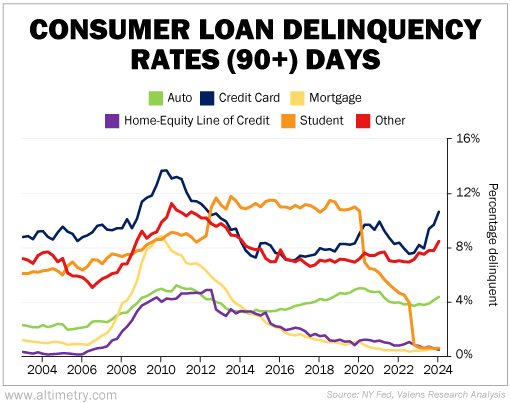Editor's note: The semiconductor and AI spaces have boomed this year. But according to Rob Spivey – director of research at our corporate affiliate Altimetry – that doesn't mean the overall economy is booming, too. In this article, adapted from a recent issue of the free Altimetry Daily Authority e-letter, Rob shines a spotlight on the American consumer... and explains why we can't solely rely on revolutionary tech to boost the economy.
If chips ran the economy, we'd be in the clear...
Thanks to the ongoing AI boom, semiconductors are having their biggest renaissance in years.
In May, global chip sales rose 19% to $49 billion. And in June, chipmaker Nvidia (NVDA) became the largest company in the world.
But chips don't run the economy... coffee does. And it's telling a far less exciting tale...
Even though the AI boom seems like it's keeping our economy afloat, consumer spending still makes up more than two-thirds of U.S. gross domestic product ("GDP"). And according to one report, folks simply aren't spending like they used to.
Consulting firm McKinsey monitors consumers' "intent to spend" on categories like essentials (gasoline and groceries)... semi-discretionary goods (skin care and household supplies)... and fully discretionary items (personal electronics, travel, and takeout meals).
The survey gives us valuable insight into the state of the U.S. consumer. And right now, it's looking bleak.
Essential goods are expected to hold flat. But consumers expect to slow down spending across almost every other category in the next quarter.
In personal electronics – as close as most folks get to buying chips from companies like Nvidia – consumers expect to spend about 5% less. And they intend to spend 10% less on international flights.
Overall, consumers are reeling in their spending as fast as they can. As I'll discuss today, this is a sign that the economy is not "all clear"... even as chipmakers keep raking in the big bucks.
Even more damning than electronics, consumers expect to spend 4% less at "quick service" restaurants...
This category includes coffee chains like Starbucks (SBUX), which offer a reliable glimpse into how consumers are doing.
Even before McKinsey's gloomy survey results, Starbucks was already giving us warning signs. U.S. same-store sales fell 3% in the second quarter. Transaction volumes fell 7%.
And management warned that the rest of the year would be slow, too. Starbucks slashed its full-year revenue guidance from "up 7% to 10%" to just "low single digits."
The company is clearly worried consumers will keep spending less. The reason is simple... consumers are running out of money to spend.
When money gets tight, people are forced to spend less and borrow more. That means higher credit-card balances, bigger auto loans, and more monthly payments.
This can work for a while... but it always reaches a breaking point if it goes on for too long.
And now, we seem to be rapidly approaching that breaking point...
We're several years past pandemic-era stimulus packages. Student-loan payments resumed nine months ago. And consumers are showing signs of stress.
Over the past few quarters, consumer-loan delinquency rates have started rising... fast.
The following chart shows the percentage of consumer loans that are at least 90 days delinquent in any given period, for every quarter in the past two decades.
Between the fourth quarter of 2023 and the first quarter of 2024, every major loan category besides home-equity lines of credit had higher delinquencies. Take a look...
Credit-card delinquencies are particularly worrying. The 90-day delinquency rate reached 10.7% in the first quarter... up from just 8.2% in the first quarter of 2023.
No wonder folks aren't willing to spend as much on nonessentials... They don't have the cash or the spare room on their credit cards.
AI and computer chips are helping power roughly 60% to 70% of U.S. stock market capitalization...
It's a massive transformation for corporate investment that will have a lasting impact on the economy. It'll also likely keep parts of the economy strong in the coming quarters.
But we can't expect earnings growth to really accelerate when two-thirds of the U.S. economy – in other words, the U.S. consumer – is on the ropes.
And until consumer health starts rebounding, our outlook remains cautious... even with our optimism about AI.
Regards,
Rob Spivey
Editor's note: Tomorrow at 1 p.m. Eastern time, Altimetry founder Joel Litman will reveal a critical twist in the AI story. You see, the public will soon learn about a radical new form of this technology, thanks to a single announcement from Silicon Valley... And it could trigger a sudden panic in the stock market.
Millions of people are likely to pour money into all the wrong stocks. That's why Joel is warning investors to prepare now. He'll share the details in tomorrow's online broadcast... Click here to reserve your free spot now.
Further Reading
Investors are buying up the biggest AI players. But they're not the only AI-related companies with huge upside potential. Here's one under-the-radar consulting firm that could see massive gains from this trend in the coming years... Read more here.
Stocks are hitting new all-time highs, despite the rocky economy. Some folks worry that means a crash is imminent. But history shows buying after new highs can lead to major outperformance – not just in the short term, but for years to come... Learn more here.


